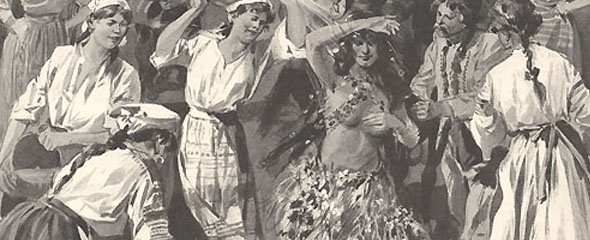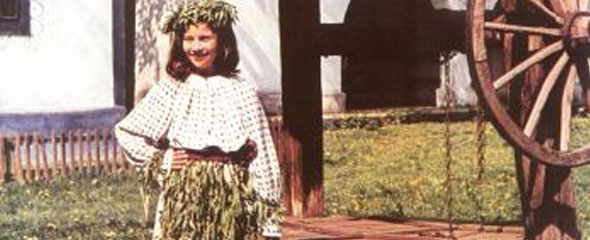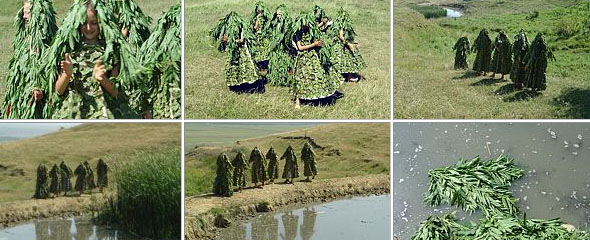In times of drought, when the sun burns the fields and hope for rich harvests is lost, a young girl walks the dusty street of the village. She’s wearing willow leaves around her waist, she walks and dances with a graceful pace, yet sometimes her movements are daring, erotic almost as her arms reach to the sky and her voice sends an ancient calling to Paparuda, the goddess of rain:

“Paparuda, ruda,
Vino de ne uda
Ca sa-nceapa ploaie,
Sa curga siroaie”
(Come litle rain, come and make us wet. When you come with the sieve, let it be a barnful.)
The girl walks on every street and stops to dance her pagan dance at every house in the village. Sometimes she is followed by other villagers who dance and sing around her, sometimes she performs the ritual alone. She has to please the goddess, who in return will bless the thirsty fields with heavy rain.
I watched the dance as a young girl - I remember I was 12 years old. That summer was particularly dry so the people in my grandma’s village decided it was time to call the goddess of rain. A pagan incantation, an heresy if you want, but even the priest of the village believed… A young gypsy girl was chosen to dance. She started the ritual at the village’s public fountain then continued on every street… at every house, as the tradition required.
It was in incredible experience, one of the dearest memories from my childhood and sure one of the most extraordinary, unbelievable, incredible. Do you know why? Because it did rain a heavy rain that evening. It rained a storm, it poured and I remember hearing joyful laughters in the rain, happy cheers, but in the end… the people were all thanking God for the rain. The rain goddess was forgotten…

I don’t know if they still perform this ritual in the village of my childhood. There are probably villages where young girls still dance the dance that brings the rain, but I doubt that the belief is still there. Yet… I think it would be a pity for such a beautiful tradition to perish…
In areas where rains suffice the ritual was never not known. Originally the dance involved partial nudity, but this has changed in the last 30 years. When I was young the girls wore popular costumes under the willow skirts. But in the times when this ritual was common to every village affected by drought, partial nudity was common and necessary, as people would pour water on the rain callers. The rain callers were rewarded for their performance with corn, eggs, grains, milk, bread, fruits or money.

The text of the incantation varies from region to region, from village to village. It has an official version but the text is not known in its entire form everywhere. Only the first verse “Paparuda, ruda” seems to be common.
The ritual was performed originally by native Romanians, and later by gypsies. It’s still unclear why the change of actors. Folklorists believe that since the ritual is performed by gypsies a lot of its essence was lost. They are probably right, especially when we consider all the variations in the text of the incantation. On the other hand, since it is customary for the rain caller to be rewarded with gifts of all sorts for her performance it is possible that the gypsies misused the ritual for material gain. There are however other explanations: as the dance involved partial nudity it makes sense that only gypsy girls would dare to expose their bodies. The Romanian girls, educated in strict Orthodox spirit, wouldn’t expose themselves.
John says
Can I hug you, Mihaela?
Why do you want to hug me, John? Do you miss me that much? 😉
Perhaps the gypsies, not being so influenced by education, the Orthodox church and outside influences, have kept superstitions and rituals that others no longer believe in.
Yes, Sue, I think you are right. Gypsies kept many traditions, but unfortunately they changed the original rituals to fit their needs. A lot is lost. Well… at least not everything is forgotten.
Claudia says
Ei, se mai practica. Eu insami am fost paparuda in satul bunicilor.
JEO LUPU A.K.A JOEY BOND says
THE TRANSLATION IS COMPLETELY WRONG.
“Paparuda, ruda,
Vino de ne uda
Ca sa-nceapa ploaie,
Sa curga siroaie”
IT SAYS::PAPAR-UDA,(SLANG FOR DRENCHED)
COME AND DRENCH US
SO LET THE RAIN START
LET IT POUR ALL NIGHT
Thank you for sharing this translation, Jeo, I used a literary form in the article.
Update (25 March 2009): Your translation however is wrong too: where did you find the “night” in the first 4 verses?
Razvan says
Paparudă, rudă
By sinziene
Paparudă, rudă,
Vino de ne udă,
Ca să-nceapă ploaie,
Să curgă şiroaie
Cu galeată, leată,
Peste toată zloată:
Unde dă cu maiul
Să crească mălaiul,
Unde dă cu sapa
Să curgă ca apa.
Paparudă, rudă,
Vino de te udă,
Ca să cază ploile,
Cu găleţile,
Să dea porumburile
Cât gardurile,
Şi să crească spicele
Cât vrăbiile,
Paparudele!
Să sporească grânele,
Să umple pătulele,
Să deschize cerurile,
Să pornească ploile,
Şi să fereşti holdele,
De toate tăciunele,
Din toate ogoarele,
Paparudele!
Revista Atheneum
The correct (closer) translation
Paparudă= gypsy girl under rain goddess spell,
rudă - has a double meaning -> 1- family,
2 - repetition of the ending of the word “Paparudă” - done to
add more importance to the relation people - gypsy - goddess
Paparudă, rudă, This verse has no equal in english - see above translation
Vino de ne udă, Come and get us wet,
Ca să-nceapă ploaie, So the rain can start,
Să curgă şiroaie To come down in (buckets) / şiroaie=huge series of water drops
Cu galeată, leată, With bucket, ucket (my best of reproducing the romanian word shortening)
Peste toată zloată: Everywhere drenched mud:
Most of the verses are in a grammatically incorrect form.
Thank you very much Razvan for this translation. I don’t remember exactly where I got the translation in the article, it is obviously not my own. My own would differ from yours - there is no mention of a bucket in the verses “Ca sa-nceapa ploaie/Sa curga siroaie” what about this translation:
So the rain can start
Pouring down in streams
Also, “zloata” doesn’t mean “drenched mud” - the Romanian DEX defines the word as: “ploaie amestecata cu zapada” - so the closest English translation for it is “slush” - for the time of the year when this is celebrated slush makes no sense, however we cannot really change the meaning of the Romanian text too much - it would lose its authenticity. It’s possible that instead of “zloata” that verse ends in “ceata” or “gloata” - that would make sense. So I will use “clique” to translate this: it’s the closest term that fits (“an exclusive circle of people with a common purpose”)
The more I think about it, the more I see that there is obviously no “correct translation” (I wonder where Joe got the “night” in his variant). But we could work together to come up with one which is at least acceptable.
My translation of the first verses (and grammatically correct):
Paparuda, ruda
Come and drench us,
So the rain can start
Pouring down in streams
With the pail,
All over the clique!
Where the pestle drops
Let the maize grow
Where the hoe hoes
Let it pour like water.
(Yes, the song has different lyrics, but it’s worth listening 🙂